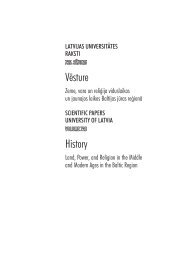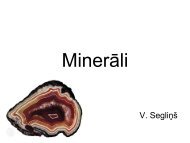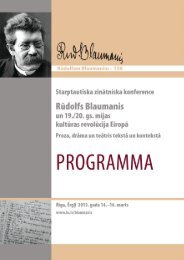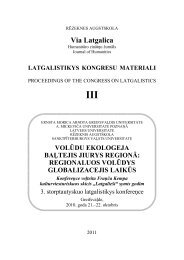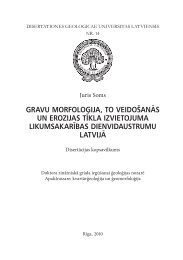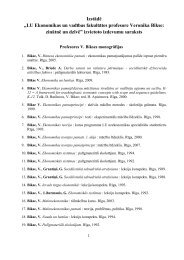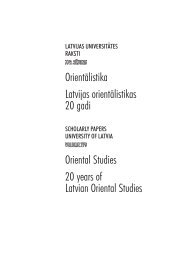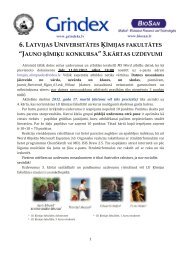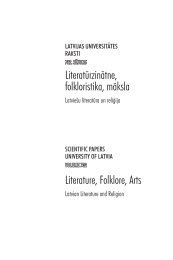Untitled
Untitled
Untitled
Create successful ePaper yourself
Turn your PDF publications into a flip-book with our unique Google optimized e-Paper software.
Diane Morgan. Tirdzniecîbas gars un kosmopolîtisms: Kants un Herders ðodien<br />
133<br />
angelic. Indeed, as we will see, the gel used to bind together egotistical and greedy<br />
humans draws its cohesive powers from these very mortal instincts. It is not dependent<br />
on some miraculous moral conversion and can function even in a “nation of<br />
devils”. 19<br />
In nature, humans are divided amongst themselves by differences in religion and<br />
language, which provoke, of course, much suspicion, hatred and an excuse for warmongering.<br />
However, with a gradual rapprochement between the peoples of the<br />
world, furthered by a basic agreement about fundamental principles, these same differences<br />
can give rise to “lively competition” and between a variety of multicultural<br />
forces a positive equilibrium can be found. Compared with the amalgamated uniformity<br />
of identity desired by despots, such an irreducible divergence of socio–cultural<br />
perspective is decidedly healthy. The community Kant is aiming for is one which<br />
brings together people in their differences, even because of their differences. In his<br />
analysis Kant relies on a force which is stronger than the respect for the concept of<br />
cosmopolitan right and that is the wish for financial gain. It is this force which motivates<br />
the spirit of commerce (Handelsgeist) whose transactions are alimented by difference,<br />
whose links are cemented by mutual self–interest and which much prefers<br />
the stability of peacetime to war for its business exchanges. 20<br />
As we have seen, the Handelsgeist plays a major role in Kant and Herder’s vision<br />
of a future cosmopolitan community and the latter specifically evokes its embodiment<br />
in die Hanse as a model of unmediated, non–alienated, cross–cultural relations<br />
of exchange and communication.<br />
Retrospectively it could indeed be maintained that die Hanse was a period in the<br />
history of commerce perched on the verge of, but not yet to be characterised as, nascent<br />
capitalist manufacturing with its “objectified labour” and its colonial slavery.<br />
Hence its attraction for Herder as he attempts to charts through the ages the fortunes<br />
and achievements, misfortunes and wastages of human industry (Fleiâ).<br />
Die Hanse was originally a loose association, or – to use Friedland’s word<br />
“Schar”, of traders, authorised to carry out transactions abroad, who were not bound<br />
indissociably together by an oath of allegiance (as guild members were), but rather<br />
joined together by purposive self–interest necessitating reciprocal arrangements with<br />
and guarantees from others. 21 However, the traders who chose to enter the League<br />
themselves in turn belonged to their respective guilds which promoted the skills of<br />
the various crafts, protected working conditions, controlled the quality of the artefacts<br />
and regulated the size of the masters’ workshops thereby– according to analysts such<br />
as Marx– thwarting their transformation into full blown capitalists22 . 23 The protectionism<br />
of the guilds at least was able for a time to maintain the specificity of different<br />
trades and crafts whilst, through the interface of the Hanseatic League, reaching foreign<br />
markets – thereby making giving rise to a different vision of globalisation from<br />
that experienced, enjoyed and suffered today, where multinationalists can be seen as<br />
emitting the same commodities everywhere.<br />
The inviting and intriguing image of globalisation I locate in the work of Kant<br />
and Herder is one for which the local (regional, national, ethnic) particularity counts<br />
and is not submerged under blanket categories. For instance Herder’s chapter on the<br />
Slavs in the Ideen zur Philosophie der Geschichte der Menschheit traces their general



